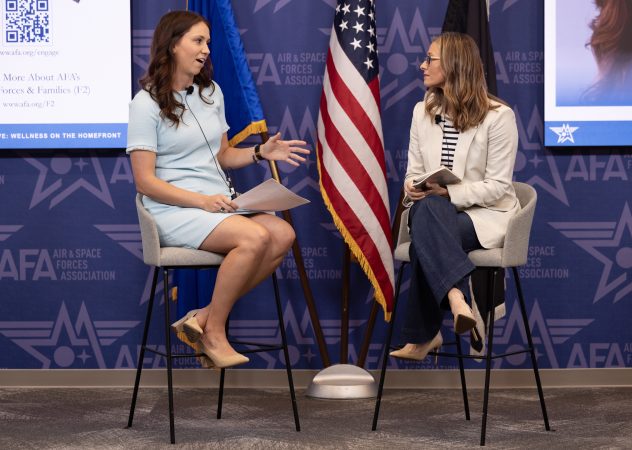S
ixteen retired four-star generals joined Air & Space Forces leadership in a joint letter to Congress advocating for greater investment in F-35 fighters in fiscal 2026 and to fund the E-7 Wedgetail as an essential successor to the E-3 AWACS.
The July 11 letter to House and Senate leaders expressed “alarm at recent proposals to reduce the next fiscal year’s (“FY”) procurement of F-35As to only 24 aircraft and terminate the E-7 Wedgetail program” and urged lawmakers to use their power of the purse to reverse both decisions.
“We cannot emphasize enough the importance of rapidly acquiring F-35As to achieve the Air Force’s requirement for 1,763 aircraft,” the generals wrote, citing the jets’ role in Operation Midnight Hammer. The future of space-based targeting is bright, they said, but while “We have high confidence the U.S. Space Force will develop and deploy a space-based air battle management system… the scientific and engineering hurdles to accomplish this goal are daunting and the timeline to success is unclear.”
Six of the generals joined AFA President Lt. Gen. Burt Field (USAF, Ret.) and Lt. Gen. David Deptula (USAF, Ret.), Dean of AFA’s Mitchell Institute for Aerospace Studies on a call with reporters to explain their concerns and draw attention to the issue.
“I’m advocating that both of these platforms, the E-7 and the F35, are key to air superiority,” said Gen. T. Michael Moseley, 18th Air Force Chief of Staff, on the call. “We need them in bigger numbers if we’re serious. That’s why I decided that it was time to sign on to something that would go to the Congress. … Air superiority is key to winning wars.”
The letter was signed by:
- Gen. Joseph W. Ralston, USAF (Ret.), 4th Vice Chairman of the Joint Chiefs of Staff and 13th Supreme Allied Commander, Europe (NATO)
- Gen. Merrill A. McPeak, USAF (Ret.), 14th Chief of Staff of the United States Air Force
- Gen. Ronald R. Fogleman, USAF (Ret.), 15th Chief of Staff of the United States Air Force
- Gen. Michael E. Ryan, USAF (Ret.), 16th Chief of Staff of the United States Air Force
- Gen. John P. Jumper, USAF (Ret.), 17th Chief of Staff of the United States Air Force
- General T. Michael Moseley, USAF (Ret.), 18th Chief of Staff of the United States Air Force
- Gen. Mark A. Welsh III, USAF (Ret.), 20th Chief of Staff of the United States Air Force
- Gen. John D.W. Corley, USAF (Ret.), 32nd Vice Chief of staff of the United States Air Force and 8th Commander of Air Combat Command
- Gen. Philip M. Breedlove, USAF (Ret.), 17th Supreme Allied Commander, Europe (NATO) and 36th Vice Chief of Staff of the United States Air Force
- Gen. Ralph E. Eberhart, USAF (Ret.), 1st Commander, U.S. Northern Command (USNORTHCOM) and NORAD
- Gen. Kevin Chilton, USAF (Ret.), 7th Commander, U.S. Strategic Command and 14th Commander, Air Force Space Command
- Gen. Lori J. Robinson, USAF (Ret.), 7th Commander, U.S. Northern Command (USNORTHCOM) and NORAD
- Gen. John M. Loh, USAF (Ret.), 24th Vice Chief of Staff of the Air Force and 1st Commander, Air Combat Command
- Gen. Herbert J. “Hawk” Carlisle, USAF (Ret.), 11th Commander, Air Combat Command
- Gen. Robin Rand, USAF (Ret.), 4th Commander, Air Force Global Strike Command
- Gen. Lance W. Lord, USAF (Ret.), 12th Commander, Air Force Space Command
- Brig. Gen. Bernie Skoch, USAF (Ret.), AFA’s Board Chair
- Lt. Gen. Burt Field, USAF (Ret.), AFA’s President and CEO
- Lt. Gen. David Deptula, USAF (Ret.), Dean, Mitchell Institute of Aerospace Studies.
Former SECAF Kendall Joins AFA Board
Frank Kendall, the 26th Secretary of the Air Force, has joined the AFA Board of Directors as an Armed Forces Director.
Armed Forces Directors are appointed by the Chairman and are voting members of the Board. Kendall joins fellow Armed Forces Directors Gen. David Goldfein, former Air Force Chief of Staff; Roger Towberman, former Chief Master Sergeant of the Space Force; and JoAnne Bass, former Chief Master Sergeant of the Air Force.
Kendall led the Department of the Air Force from 2021 to 2025, has more than 50 years of experience in engineering, management, defense acquisition, and national security affairs, including private sector, government, and military experience. A West Point graduate and retired Army officer, he has been a consultant to the defense industry, nonprofit research institutions, and defense agencies.
“During the four years he led the Department of the Air Force, Mr. Kendall was a steadfast supporter, friend, and believer in AFA’s value and mission,” said AFA Board Chair Brig. Gen. Bernie Skoch, USAF (Ret.). “His depth of knowledge and wide-ranging expertise will be invaluable in furthering our mission to develop dominant air and space forces as the bedrock of our national defense.”
“I’m pleased to join the AFA board and continue to advocate on behalf of Airmen, Guardians, and the American people for the air and space forces. America needs to deter conflict and fight and win, if fight we must,” Kendall said. “AFA’s role in informing the public and making the case for airpower and space power is as vitally important today, as it has ever been since its founding nearly 80 years ago.”
Forces & Families Day Focuses on Wellness
AFA hosted ENGAGE: Wellness on the Homefront, a daylong event dedicated to the analysis and exploration of military and veteran spouse wellness at its headquarters in Arlington, Va, in June. The event included the public data release of the “Military Spouse & Veteran Spouse Wellness Survey,” an independent poll of 1,200 spouses of Active-duty and veteran service members. The study’s authors billed it as the first study of its kind.
More than 50 guests, including several spouses of members of the Joint Chiefs of Staff, both past and present—joined hundreds more online.
The survey was a collaborative research initiative between the University of Texas at Austin’s Institute for Military and Veteran Family Wellness (IMVFW) and InDependent, a nonprofit run by and for military spouses. Respondents reported moderate overall wellness satisfaction, with an average rating of 6.58 out of 10, but more than 50 percent of respondents said they had experienced some level of anxiety or depression, at a rate two to three times the general population—and almost a quarter of respondents said accessing mental health care for themselves was a challenge.
“About 50 percent of participants felt that finding community or friends was the number one challenge that they are currently facing,” said Evie King, president of InDependent. “You can probably start sewing a line through so many areas of wellness where this trend seemed to resonate.”
Elisa Borah, director of IMVFW, which built the survey agreed. “We know that this lifestyle is isolating, lonely, it leads to mental health concerns if you’re not supported or even know how to pay attention to your mental health,” she said. “I think that’s where we can make the most impact and improve our programming.”
Following the survey report, attendees joined breakout sessions to discuss the findings among themselves. AFA shared the latest edition of ENGAGE, a publication written by military spouses for military spouses. Go to AFA.org/F2 to learn more.





